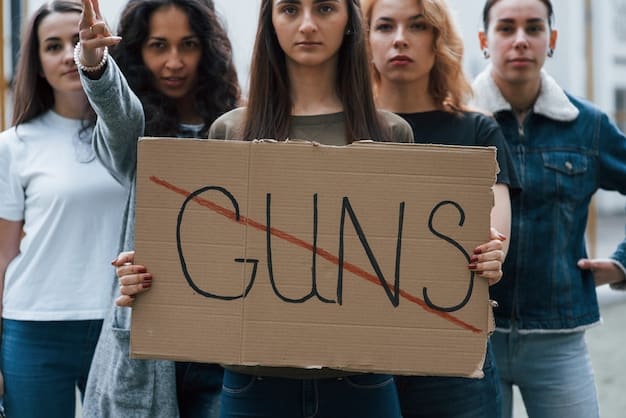Gun Control Legislation: Key Debates & Impact on Public Safety

Key debates surrounding gun control legislation in the US center on balancing Second Amendment rights with public safety concerns. These discussions involve varying perspectives on background checks, assault weapon bans, and the role of firearms in preventing or contributing to violence, significantly impacting communities nationwide.
The issue of gun control legislation is continuously debated in the United States, and understanding what are the key debates surrounding gun control legislation and how could they impact public safety is crucial for every citizen. This article examines those debates, exploring their potential consequences for communities across the country.
Understanding the Second Amendment
The Second Amendment to the United States Constitution guarantees the right of the people to keep and bear Arms, shall not be infringed. However, the interpretation of this right has been a central point of contention in the gun control debate.
Historical Context of the Second Amendment
Originally, the Second Amendment was designed to ensure that states could form militias for defense. Over time, this has been interpreted by some as an individual right to own guns, regardless of militia service.
Modern Interpretations and Supreme Court Rulings
Landmark Supreme Court cases like *District of Columbia v. Heller* and *McDonald v. City of Chicago* have affirmed the individual right to bear arms, but also acknowledged that this right is not unlimited and that reasonable restrictions can be imposed.
- The Heller decision established that the Second Amendment protects an individual’s right to possess firearms for traditionally lawful purposes, such as self-defense in the home.
- The McDonald case extended this right to the states, preventing them from enacting overly restrictive gun control laws.
- These rulings have set the stage for ongoing legal challenges to various gun control measures.
Understanding these interpretations is essential for grasping the legal landscape that shapes the gun control debate. It provides a framework for assessing the constitutionality of different proposed regulations.
Universal Background Checks: A Core Debate
One of the most debated topics in gun control is the implementation of universal background checks. Current federal law requires licensed gun dealers to conduct background checks on purchasers, but private gun sales often occur without this requirement.

The Argument for Universal Background Checks
Supporters of universal background checks argue that they are essential to prevent guns from falling into the hands of individuals legally prohibited from owning them, such as convicted felons, domestic abusers, and those with specific mental health conditions.
Concerns about Implementation and Privacy
Opponents raise concerns about the practicality of enforcing universal background checks, particularly in rural areas. They also express worries about potential government overreach and the creation of a national gun registry.
- Advocates suggest using existing databases and expanding the National Instant Criminal Background Check System (NICS) to cover all gun sales.
- Opponents propose alternatives like stricter enforcement of existing laws and focusing on mental health treatment.
- The debate also involves the role of private gun sales and the potential burden on law-abiding citizens.
This debate highlights the challenge of balancing public safety with individual rights. Resolving these concerns is crucial for any potential legislative action.
Assault Weapons Bans: Effectiveness and Scope
Another key area of contention is the banning of assault weapons. These bans typically target semi-automatic rifles and high-capacity magazines, aiming to reduce the potential for mass shootings and gun violence.
Defining “Assault Weapons” and Their Use in Crime
The definition of ‘assault weapon’ varies, leading to confusion and disagreement. These weapons are often singled out due to their military-style design and high rate of fire, although their actual use in overall gun crime is debated.
Arguments for and Against Bans
Supporters of bans argue that these weapons are disproportionately used in mass shootings and pose a significant threat to public safety. Opponents claim that such bans infringe on Second Amendment rights and that these weapons are commonly used for self-defense and sport shooting.
- Studies on the effectiveness of assault weapon bans have yielded mixed results, with some showing a decrease in gun violence during the ban period and others finding no significant impact.
- The debate includes discussions about the types of firearms to be included in any ban and the exceptions to be made for hunting and sport shooting.
- The overall goal is to reduce gun violence while respecting the rights of responsible gun owners.
The issue is complex, requiring a thorough understanding of the data and the potential consequences of any legislative action.

Red Flag Laws: Balancing Rights and Safety
Red flag laws, also known as extreme risk protection orders (ERPOs), allow law enforcement or family members to petition a court to temporarily remove firearms from individuals deemed a threat to themselves or others.
How Red Flag Laws Work
These laws typically require a court hearing, where evidence is presented to demonstrate the individual’s potential for violence. If the court agrees, a temporary order is issued, and the individual’s firearms are confiscated.
Potential Benefits and Concerns
Proponents argue that red flag laws can prevent suicides and mass shootings by temporarily disarming individuals in crisis. Opponents express concerns about due process and the potential for abuse.
- Advocates point to studies showing a reduction in suicides in states with red flag laws.
- Critics argue that these laws can be used to unfairly target individuals and that they may not effectively prevent violence.
- The debate includes discussions about the criteria for issuing an ERPO and the safeguards to protect individual rights.
Finding the right balance is crucial to ensure that these laws are both effective and respectful of civil liberties.
Mental Health and Gun Violence: Addressing the Root Causes
The relationship between mental health and gun violence is complex. While the vast majority of individuals with mental illness are not violent, mental health issues can be a contributing factor in some cases of gun violence.
The Role of Mental Health in Gun Violence
Studies show that individuals with severe mental illnesses, particularly when compounded by substance abuse, are at a higher risk of committing violent acts. However, this is not the primary driver of gun violence.
Improving Access to Mental Health Care
Many advocate for improving access to mental health care as a means of preventing gun violence. This includes increasing funding for mental health services, reducing stigma, and expanding insurance coverage.
- Expanding access to mental health care can help identify and treat individuals at risk of violence.
- Addressing the social determinants of mental health, such as poverty and lack of opportunity, can also play a role in reducing violence.
- The focus should be on prevention and early intervention, rather than solely on restricting gun ownership.
Addressing mental health is a critical component of any comprehensive strategy to reduce gun violence.
The Impact on Public Safety: Data and Trends
Evaluating the impact of gun control legislation on public safety requires careful analysis of data and trends. This includes examining rates of gun violence, mass shootings, and suicides in states with different gun laws.
Analyzing Gun Violence Statistics
The United States has a significantly higher rate of gun violence compared to other developed countries. This is often attributed to the availability of firearms and the presence of permissive gun laws.
Correlation vs. Causation
It’s essential to distinguish between correlation and causation when evaluating the effectiveness of gun control measures. While some studies show a correlation between stricter gun laws and lower rates of gun violence, this does not necessarily prove that the laws are the direct cause.
- Comparing gun violence rates across different states and countries can provide valuable insights.
- Longitudinal studies that track changes in gun violence over time are also essential.
- The goal is to identify the factors that contribute to gun violence and to develop evidence-based strategies for reducing it.
Analyzing the available data is essential for informed decision-making and for creating effective policies.
| Key Point | Brief Description |
|---|---|
| ⚖️ Second Amendment | Guarantees the right to bear arms, subject to interpretation & restrictions. |
| 🛡️ Universal Checks | Aim to prevent gun sales to prohibited individuals; debates focus on practicality. |
| 💥 Assault Weapons Ban | Debates on effectiveness in reducing gun violence and scope of definition. |
| 🚩 Red Flag Laws | Allow temporary firearm removal from individuals deemed a threat, balancing rights and safety. |
Frequently Asked Questions (FAQ)
▼
The main point of contention is whether it protects an individual’s right to bear arms for any purpose or if it’s primarily related to maintaining a well-regulated militia.
▼
They are considered important because they aim to prevent prohibited individuals from acquiring firearms by extending background checks to all gun sales.
▼
Arguments include infringing on Second Amendment rights, the weapons’ common use for self-defense, and debates over the definition of “assault weapons.”
▼
They allow for the temporary removal of firearms from individuals deemed a threat to themselves or others, potentially preventing suicides and mass shootings.
▼
There is not a significant one. While mental health can be a factor, the vast majority of individuals with mental illness are not violent; it is not a primary driver.
Conclusion
The debates surrounding gun control legislation are complex and multifaceted, involving constitutional rights, public safety concerns, and diverse perspectives. Understanding these debates and their potential impacts is crucial for informed participation in the democratic process and for shaping policies that effectively address gun violence while respecting the rights of all citizens.